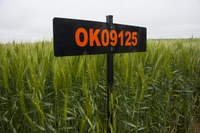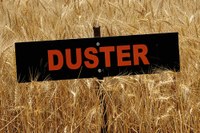Wheat
Deliver
Deliver is an awnless wheat released in 2004 by OAES and the USDA Agricultural Research Service. Deliver's pedigree is Yantar, a Bulgarian cultivar, as well as Chisholm and Karl.
Deliver is intermediate in plant height and is about the same height as 2174. Heading date is comparable to 2174 and Ok102 but a few days later than Ok101 and Jagger. It is moderately susceptible to lodging similar to Jagger and Cutter. Deliver is not well adapted to critically low soil pH.
Deliver is resistant to leaf rust (in adult plants), stripe rust, and wheat soilborne mosaic and moderately resistant to septoria leaf and glume blotch. It is moderately susceptible to tan spot and wheat streak mosaic virus. Kernel size has been large and consistent (determined by the weight of kernels retained on a No. 7 screen).
North-central Oklahoma is the primary area of adaptation spreading to southwestern and northwestern Oklahoma as secondary areas. Deliver may be recommended for a dual-purpose system, a grain-only system or a hay-production system.
U.S. Protected Variety (PVPA 1994 and Title V) - to be sold by variety name only as a class of certified seed.
Endurance
The OAES released Endurance in 2004. Its pedigree is a Pioneer breeding line, TAM 105, Siouxland and 2180.
Endurance is a moderately tall semidwarf averaging 34 inches. The variety reaches heading at the same time as Ok102 and 2174 (approximately two days later than Ok101 and three days later than Jagger). It has intermediate or slightly below average test weight.
Endurance is tolerant to very tolerant to low pH conditions and has intermediate to moderately good straw strength. It is moderately resistant to leaf rust (in adult plants) and stem rust, intermediate resistance to stripe rust and fusarium head blight. Endurance is moderately susceptible to septoria and tan spot and susceptible to powdery mildew.
The area of adaptation is Oklahoma and points northward. Endurance will likely appeal to dual-purpose and grain-only producers alike.
U.S. Protected Variety (PVPA 1994 and Title V) - to be sold by variety name only as a class of certified seed.
Triumph 64
Triumph 64 was developed by a private plant breeder, Mr. Joseph Danne, El Reno, Oklahoma, and released by him in 1948 or 1949 as Rust Resistant Triumph. It was discovered to be susceptible to rust and approved for release by Oklahoma State University in 1964 as Triumph 64. It is superior to Triumph in yield and test weight, but is similar to Triumph in all other agronomic characteristics.
The following varieties are licensed to Oklahoma Genetics, Inc. OGI is a farmer nonprofit that distributes pedigreed seed to producers in Oklahoma and surrounding states. Producers must be members of OGI in order to purchase foundation seed for OGI varieties.
Bentley

A hard red winter wheat, Bentley features excellent grain yielding ability under challenging climate conditions, including moderate, but chronic drought stress and late winter freezes.
It also fits well in dual-purpose grazed systems and in minimum-tillage systems promoting the development of multiple leaf spotting diseases.
Bentley’s drought resistance is equal to or slightly better than Iba, which is currently our best adapted variety for drought, but it has much better leaf hygiene in the presence of leaf spotting diseases, particularly tan spot and physiological leaf spot.
This variety is best suited for growth in southwestern and central Oklahoma and areas extending north, east and possibly into south central Kansas. Its use in the panhandle should be limited to dryland conditions.
Doublestop CL+

Doublestop CL Plus was released in 2013. The wheat variety has a wide area of adaptation, is late to first hollow stem and possesses a late maturity that is about the same as Endurance. Strengths of Doublestop CL Plus include excellent test weight with good protein content and quality; yield stability across a wide range of environments, including drought-stressed and high-yield systems; good acid soil tolerance, and good milling and baking characteristics. The variety is resistant to wheat soilborne mosaic virus but exhibits inconsistent resistance to wheat spindle streak mosaic virus. It is moderately resistant to leaf rust, stripe rust and barley yellow dwarf.
Doublestop is a two-gene Clearfield wheat variety that offers improved control of problem weeds such as feral rye and jointed goatgrass. The Clearfield system is a non-genetically modified crop herbicide tolerance technology and not a genetically modified organism (GMO). As the name implies, two-gene Clearfield wheat varieties have two copies of the gene that confers resistance to imidazolinone herbicides. Two-gene technology in wheat provides the option of adding 1 percent v/v methylated seed oil (MSO) to the spray solution (1 gallon of oil per 100 gallons of water).
Duster

Oklahoma State University released Duster in May 2006 after a 19-year selection and reselection process. The variety performs well in both grain-only and dual-purpose systems in every region in Oklahoma as well as similar areas in the southern Great Plains.
Gallagher

OSU’s Gallagher wheat variety boasts Duster parentage and forage production with improved yield and disease resistance. Gallagher is an early maturing variety with good grazing tolerance, and exhibits an approximate 15 percent increase in seed size over Duster. It is resistant to leaf rust and strip rust, wheat soilborne mosaic virus and wheat spindle streak mosaic virus. In addition, Gallagher is moderately resistant to tan spot and barley yellow dwarf. The variety is also septoria leaf blotch resistant for no-till and high-residue systems.
Gallagher exhibits an acid soil tolerance comparable to Duster, is Hessian fly resistant and has the ability to exceed 12 percent grain protein with adequate fertilization. It has good stay green and shattering tolerance characteristics, with above average baking and milling characteristics.
The wheat variety is well suited for Oklahoma operations, with the exception of those in the Panhandle, which is considered a secondary area of adaptation.
Iba

Released by Oklahoma State University, Iba features a broad area of adaption with proven yielding ability reflected in performance tests from Kansas to Texas. Of Duster parentage, the variety has outstanding test weight and average to above average resistance to leaf rust, stripe rust, powdery mildew and soilborne mosaic virus.
NF101
NF101 is the first wheat variety developed at the Samuel Roberts Noble Foundation for high fall and winter yield suitable for sustainable forage production and better grain production. The variety produced the greatest fall-winter forage yield when compared to other varieties during seven years of testing. It is well adapted to southern Oklahoma, northern Texas and the southeastern United States.
Spirit Rider
Spirit Rider captures the beneficial characteristics for which its parent, OK Bullet was known, but with higher yield potential.
This variety offers improved straw strength, standability and yield potential. It also has good disease resistance. Best suited to north central and northwest portions of Oklahoma, including the Panhandle, Spirit Rider exhibits outstanding baking and milling qualities.
Smith's Gold
A solid dual-purpose variety, Smith’s Gold features excellent yield potential with strong greenbug and Hessian fly resistance as well as protection against stripe rust earlier in the spring and after flowering in the adult-plant stages.
This variety’s parentage includes Gallagher, a popular variety also developed by OSU.
Smith’s Gold will work well anywhere Gallagher thrives and demonstrates exceptional baking and milling qualities.
Stardust
 Stardust is the first hard white wheat variety released by OSU since OK Rising in 2008.
Stardust is the first hard white wheat variety released by OSU since OK Rising in 2008.
This variety’s parentage includes OK Rising. Featuring an improved level of sprout tolerance with agronomic capabilities and yield potential comparable to some of OSU’s most popular hard red varieties, Stardust’s quality characteristics and lighter brancoat make it a strong and versatile choice for bread baking.
Consumer preference is fueling the high and increasing demand for hard white wheat. Whole grain white bread is made from hard white wheat, which allows bakers to create a whole grain product without the red color or the slightly different taste. Millers also can extract more flour from the grain of hard white wheat, thereby increasing the efficiency of the milling process.
Stardust will provide wheat producers in north central Oklahoma, in particular, the ability to produce hard white wheat locally and potentially capture more markets for Oklahoma wheat.
All OGI Varieties are under PVP and the Clearfield Varieties also have a patent.
Unauthorized Propagation Prohibited - To Be Sold By Variety Name Only As A Class of Certified Seed- U.S. Protected Variety -(1994 PVPA and Title V)





